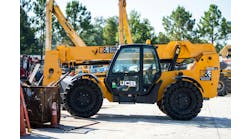Lincoln Electric Adds Blueprint Reading to U/LINC Curriculum
Lincoln Electric is introducing a new education offering as part of the U/LINC welding and cutting curriculum program. Blueprint Reading is a comprehensive, multi-lesson curriculum module aimed at understanding and working from a typical welding blueprint.
Each lesson in the Blueprint Reading series includes a lesson plan, student reference, presentation and quiz, while some also feature a lab activity to reinforce skills learned. All lessons incorporate symbols and terminology pertaining to American and ISO standards, making them a valuable training resource for instructors and students anywhere in the world.
Blueprint Reading lessons will help students master key skills including understanding the use of different scale types used on drawings: identifying height, width and length dimensions; interpreting welding symbols and notations; and drawing multiple view sketches. Mastering the skills enhances welding careers across multiple industries and disciplines, including fabricators, related trades and engineering.
“Many educators have been asking us to tackle a blueprint reading module for our U/LINC welding and cutting curriculum offering,” said Chris Gandee, manager, Lincoln Electric Education Services. “Following development and testing, we’re excited to launch this comprehensive group of lessons for welding career school programs.”
With a unique insight into the issues manufacturers face every day and the skills they need from workers to meet today’s demands, Lincoln Electric is well-positioned to help educators provide welding training to students at every level – high school, trade school and college, as well as mid-career welders looking to enhance their skills or change careers.
Blueprint Reading expands the scope of U/LINC for career tech welding and cutting curriculum.
“Employees in every industry demand this skill, and it’s important for schools to cover this material to make their graduates more marketable,” said Gandee. “Students will appreciate mastering an additional skill that will help them throughout their career.”










